Abacus Election Bulletin: Current Vote and Leader’s Impressions among the LGBTQ2S+ Community.
August 19, 2021
Each day during the 2021 Federal Election campaign, researchers at Abacus Data will share insights and analysis from our polling in concise, insights-focused reports. To never miss our polls and analysis, subscribe to our newsletter.
This election season comes at a critical moment for Canadians. As we continue the fight against COVID-19, we’ve seen Indigenous peoples from across the nation call for accountability in the wake of mass gravesite discoveries, countless Black Canadians take to the streets in protest of police brutality, and many conversations and conflicts regarding the national housing crisis. As people across the nation fight for a better Canada, this election provides an opportunity to make meaningful change for all – Including LGBTQ2S+ communities.
LGBTQ2S+ communities across Canada have a unique outlook on our nation and politics. Having experienced a different life than many other Canadians, LGBTQ2S+ communities across the nation have struggled and persevered in ways others might not have had to. Similarly, the LGBTQ2S+ community and its allies hold a truly unique perspective when it comes to voting in federal elections.
In our pre-election survey (conducted August 6 to 11 with 3,000 Canadians overall, 259 of which self-identified as LGBTQ2S+), we find that among the LGBTQ2S+ community, the NDP lead by 5-points over the Liberals. The LGBTQ2S+ community is twice as likely to vote for the NDP, and half as likely to vote for the Conservatives than the general population. Interestingly, the Liberal vote remains consistent between Canadians overall and the LGBTQ2S+ community. It is important to note that this sample is much younger than the general population, which most likely explains their views on the NDP and Jagmeet Singh.
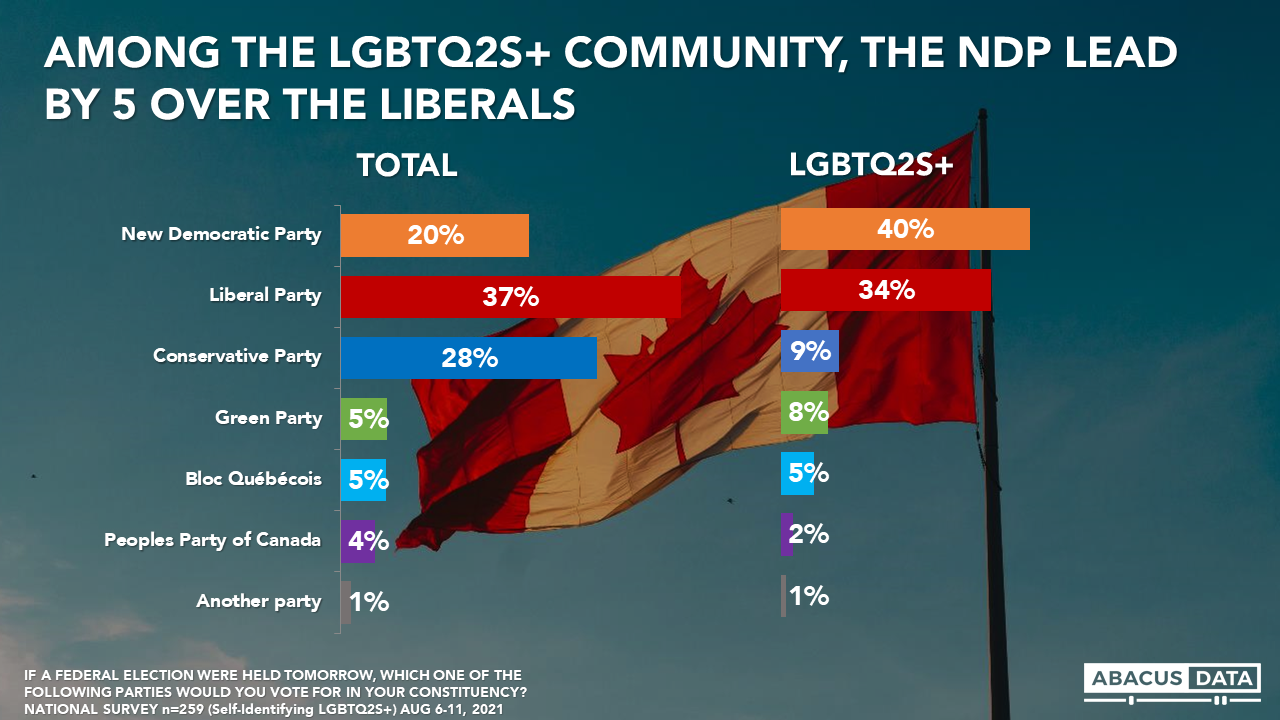
[sc name=”signup”]
Vote drivers differ slightly among the LGBTQ2S+ community when compared to the general population. Cost of living (63%), climate change and the environment(57%), and poverty and inequality (56%) are the top vote drivers for LGBTQ2S+ Canadians. Among the general population, cost of living (61%), Access to health care (47%), and climate change and the environment (45%) top the list of vote drivers. Interestingly, taxes and government spending were significantly lower drivers for those in the LGBTQ2S+ community on average.
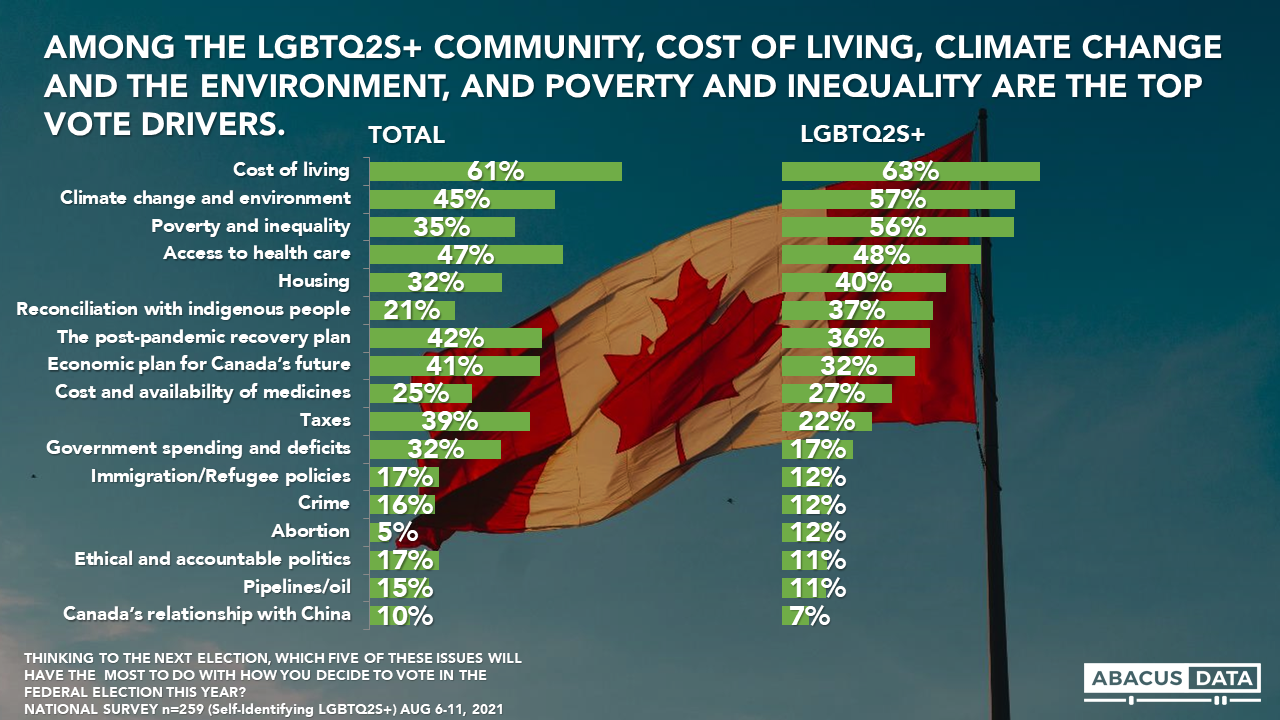
LEADER IMPRESSIONS
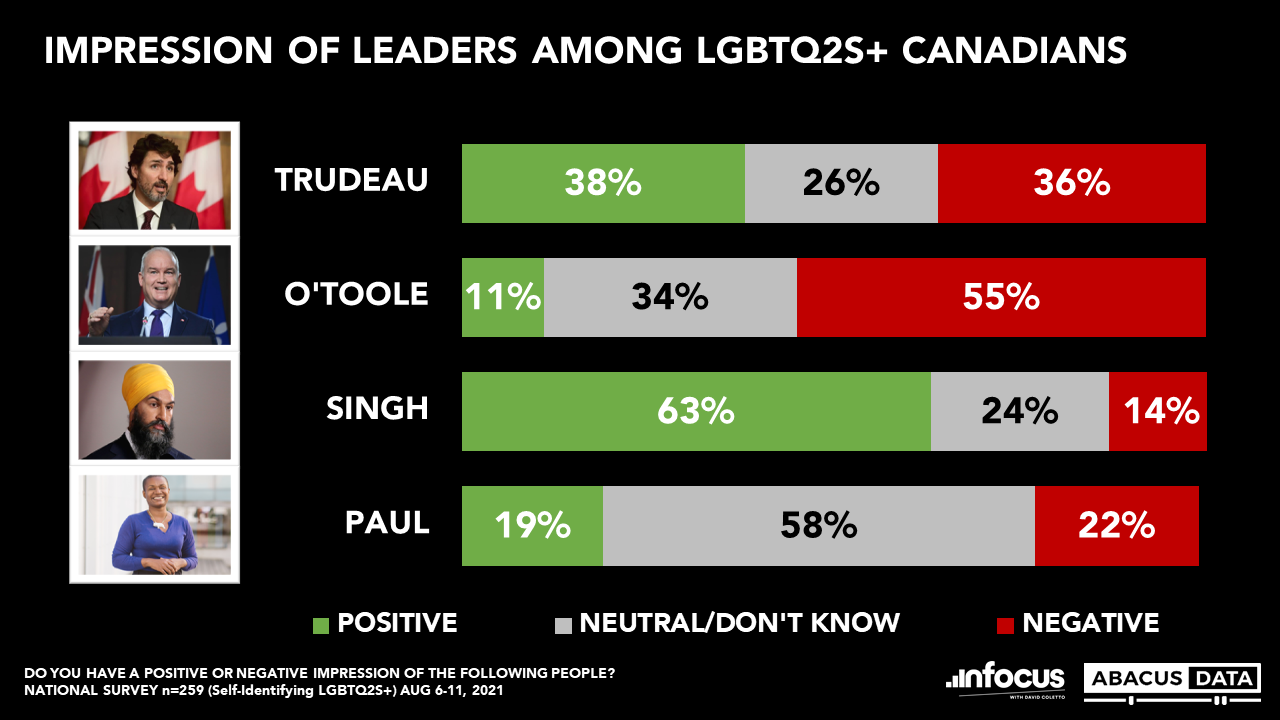
It is also the case that LGBTQ2S+ communities across Canada have a unique perception of their political leaders. Among these communities, Singh is a stand-out favourite, with 63% holding a positive impression of him. This is followed by Trudeau (38%), Paul (19%), and O’Toole (11%) respectively.
Among all the leaders, Jagmeet Singh has the highest net positive impression at +49. Positive impressions are highest among previous NDP voters, Males aged 18-29, Females aged 30-44, and those living in Ontario.
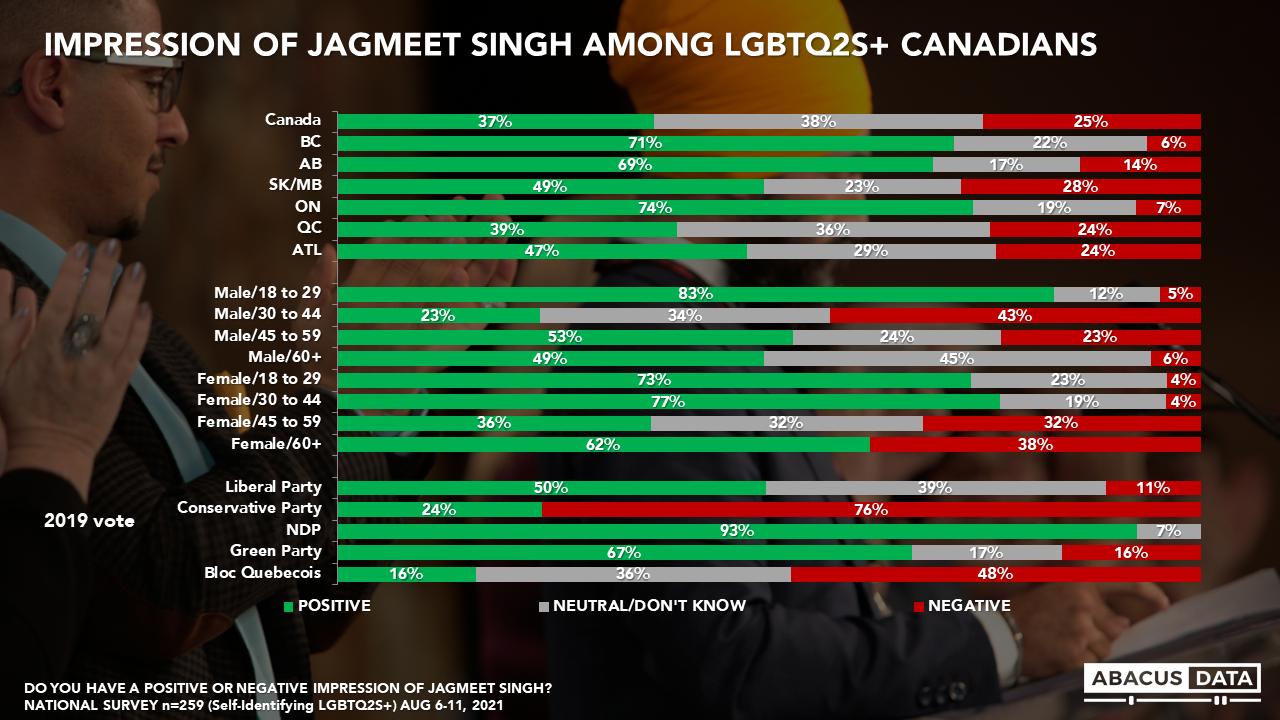
Justin Trudeau enjoys a positive impression among 38% and negative impressions among 36%, for a net score of +2. Positive impressions are significantly higher among males aged 30-44.
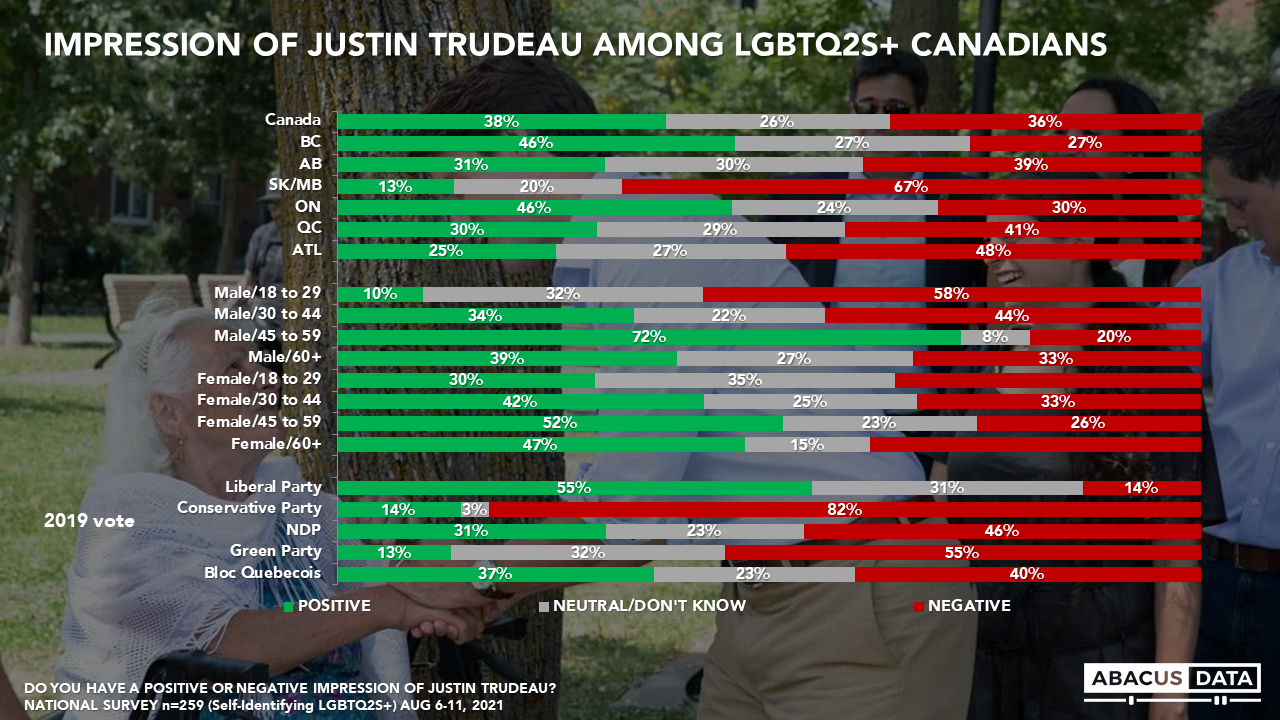
Erin O’Toole enjoys a positive impression among 11% and negative impressions among 55%, for a net score of -44. Females aged 60+, Males aged 30-44, and those living in Atlantic Canada are among the most likely to hold a positive impression of O’Toole.
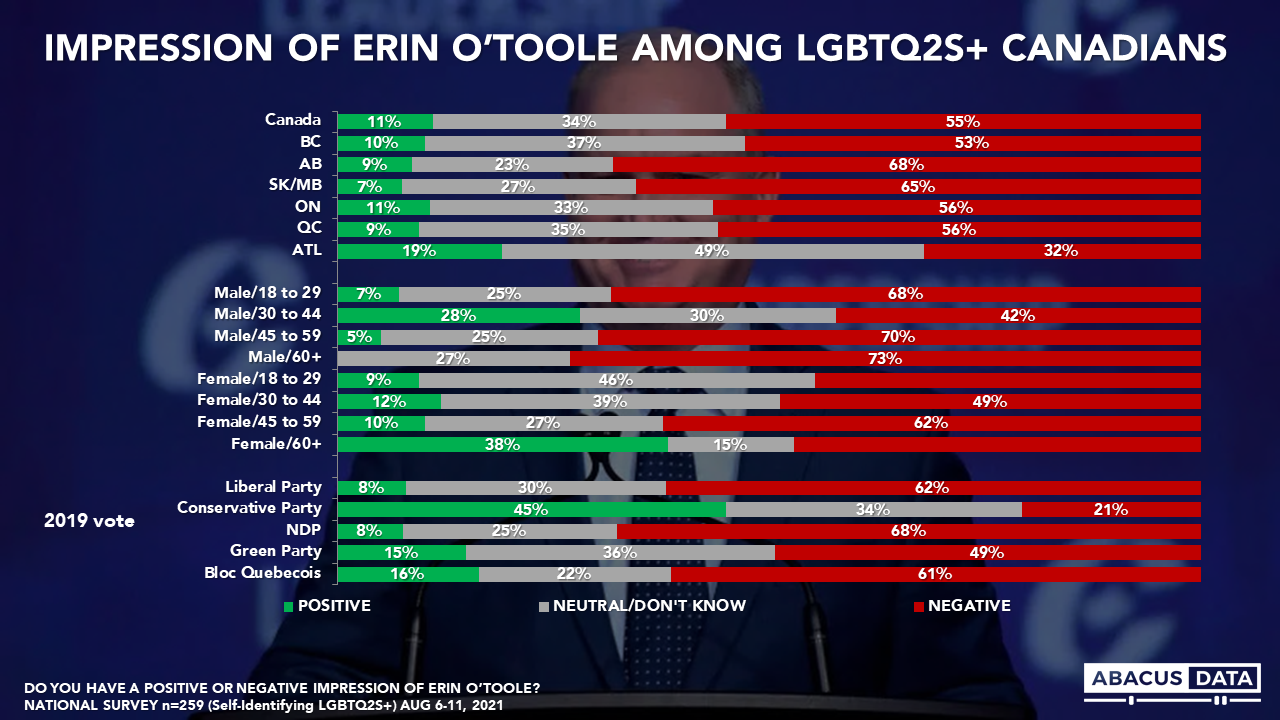
UPSHOT
Although the Liberals have been leading the polls recently, vote intention and the impressions of political leaders among the LGBTQ2S+ community we surveyed paint a different picture.
Jagmeet Singh and the NDP have clearly built a strong affinity among the LGBTQ2S+ community while the Conservatives struggle to even register with this community.
With an estimated 900,000 LGBTQ2S+ Canadians and countless allies across the nation, will this be enough to sway the vote?
METHODOLOGY
The survey was conducted with 3,000 Canadian adults from August 6 to 11, 2021. A total of A random sample of panelists were invited to complete the survey from a set of partner panels based on the Lucid exchange platform. These partners are typically double opt-in survey panels, blended to manage out potential skews in the data from a single source.
The margin of error for a comparable probability-based random sample of the same size is +/- 1.8%, 19 times out of 20.
The data were weighted according to census data to ensure that the sample matched Canada’s population according to age, gender, educational attainment, and region. Totals may not add up to 100 due to rounding.
[sc name=”signup”]
ABOUT ABACUS DATA
We are the only research and strategy firm that helps organizations respond to the disruptive risks and opportunities in a world where demographics and technology are changing more quickly than ever.
Find out more about what we are doing to help clients respond to the COVID-19 pandemic.
We are an innovative, fast-growing public opinion and marketing research consultancy. We use the latest technology, sound science, and deep experience to generate top-flight research-based advice to our clients. We offer global research capacity with a strong focus on customer service, attention to detail and exceptional value.
We were one of the most accurate pollsters conducting research during the 2019 Canadian Election.
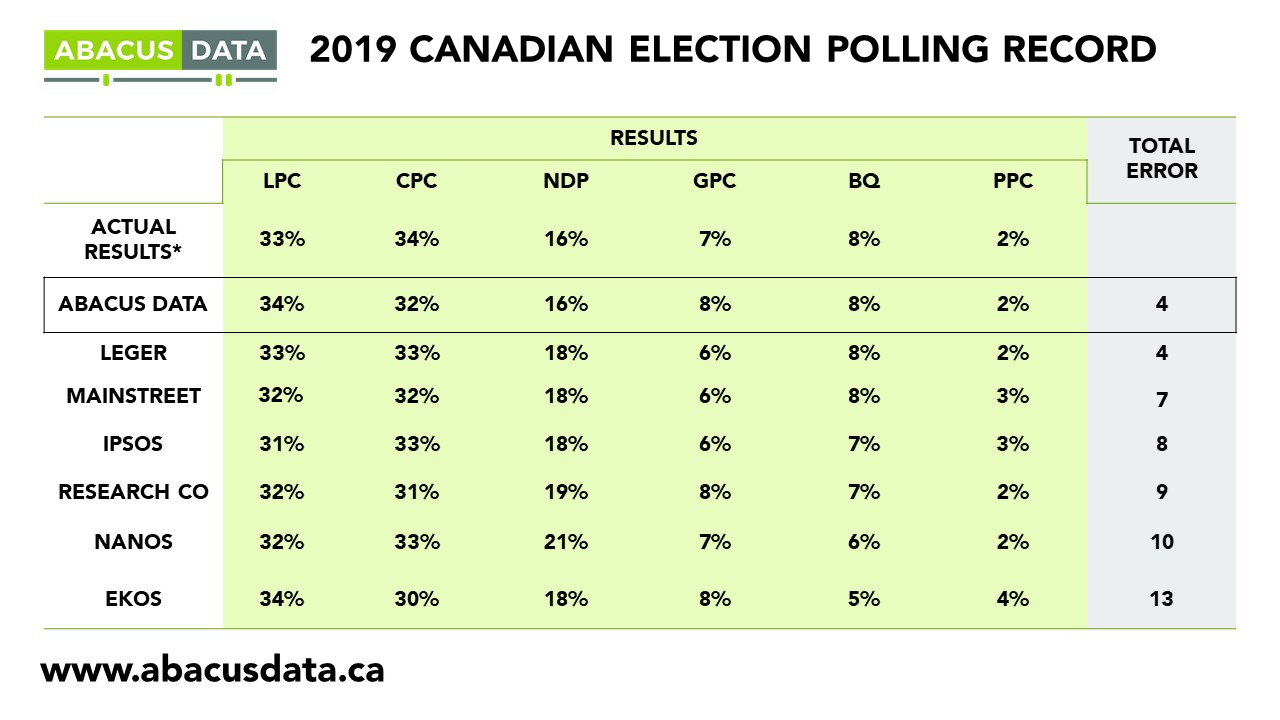
Contact us with any questions.
Find out more about how we can help your organization by downloading our corporate profile and service offering.
[sc name=”signup”]


